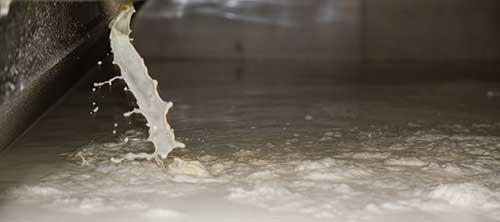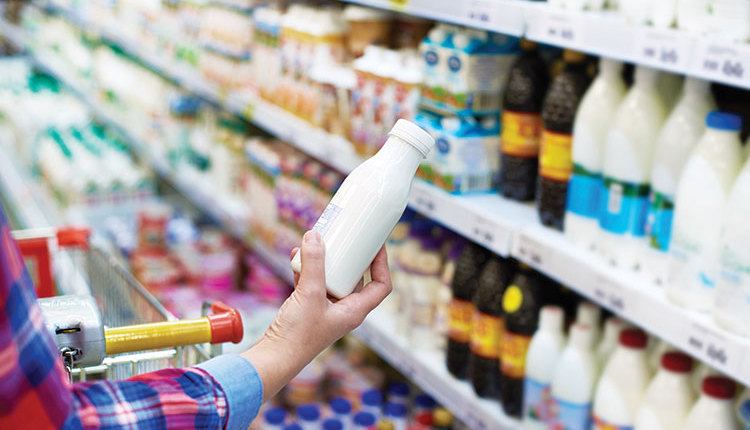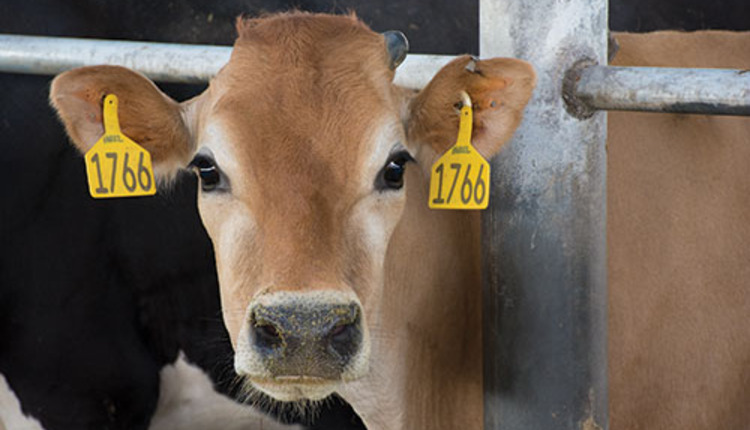The author is a director of marketing at Select Sires in the Mid-Atlantic area. He is also a graduate of the Young Dairy Leaders Institute.

MILK IS MILK . . . isn't it? The name "milk" has been somewhat marginalized.
The question is, how long will the dairy industry take it?
Milk is a powerful word. It has to be with all of the companies trying to capitalize on the connotations that come along with it. Almond milk, soy milk, rice milk and countless others have tried to capitalize on the word in an almost ironic contradiction of terms. In almost every dictionary that you can check, milk is defined as "a secretion of female mammals." Yet, in every grocery store in America, you can find a product with a milk label that has nothing to do with animals. Just like natural and healthy, marketing folks have discovered that milk is a word that sells regardless of how it is produced. After all, your grandfather produced it on his farm and it was good for you, what's not to like?
If you are a dairy farmer, there is a lot to not like about the latest flavored juice trying to pass itself off as "milk." Muufri is a startup company that wants to produce an animal-free drink that saves the milk consumer from "pus, pesticide residues, feed contaminants, heavy metals, drug residues and hormones." Given startup funding from SynBio axlr8r, a venture fund offering investment dollars and lab space, Muufri is trying to develop artificial milk proteins using three-dimensional folding that would match the output of the proteins that come from a bovine female. Think of this process as taking a string of amino acids and repurposing them to a structure that will do what we want.
Given enough time, money and research, there is little doubt that this company will be able to produce a product that resembles milk. Their Twitter account even has a picture of the proposed carton with a 2016 delivery date. The question is not if they will be able to bring a marketable product to retail, but why do they want to and what are their motivations?
Two motives
A visit to their website makes it quite obvious that Muufri and its founders do not believe that animal agriculture should exist. The main principal of the company, Ryan Pandya, admits that his quest to formulate artificial milk proteins began after a bad episode with vegan cream cheese. You can't make this stuff up and the whole Muufri purpose would be comical if the degree with which they want to work to put American dairy farmers out of business wasn't so serious.
Ultimately, the mission of this company is to usurp the good reputation of milk and either financially capitalize on that name with their imitation product or confuse the marketplace with such an inferior representation that "milk" loses its appeal. In their mind, if either thing happens, they win.
Let's set the stage
For all of our discussion on labeling laws over the past few years, probably the best labeling law we could pass would be the one where "milk" has to come from a female mammal. The dairy industry group that could be the first to get that law passed in their state would set the precedent and give our industry the protection that we need in the dairy aisle. It would relegate these companies, with names that aren't quite as clever as they think, to the juice aisle where they belong where the smart consumer would not even give them a second look. It can happen, and it should happen to avoid continued erosion of the terminology of the dairy case.
The aforementioned carton that this company has produced lists "animal-free milk" right on the label. To most Americans, that's akin to saying "fruit-free apple pie."
In order for us to maintain the category and defend the hard work of past generations that have given us a positive reputation with the consumer, we must coordinate efforts among producers, processors and retailers to take our name back. If we do not, we will continue to see imitation products with no connection to our industry capitalize on our efforts.
If this company was not using the term "milk" across its marketing efforts, they would be getting very little attention and very few dairy farmers would have reason to be upset. Many companies have developed protein-based drinks before and the marketplace has generally decided if the product will succeed. In this case, the founder of the company admits that his original efforts to engineer meat tissue through bioengineering were too challenging, so he decided to pursue something that was "more simple" like reproducing the six key milk proteins for "environmental and ethical reasons."
That, too, should give pause to most consumers whether you are involved in dairy farming or not, here is a bioengineering startup receiving funding from a venture capital incubator because they don't approve of the way that an industry legally conducts business. All the more reason why our industry education efforts must continue, to show that the efforts of companies like this one with research citations that link to Wikipedia are misguided.
Consider cereal and soy milk
Ultimately, the consumer will decide, and only future spots in the dairy case will identify who won the battle for the term of milk. Human psychology is always an interesting topic and people buying milk can have the mindset that they are getting the product that they grew up on even if it comes from a soybean plant or a laboratory.
Here is an interesting fact that may be just a coincidence but the similar dates do lead to a possible cause and effect. Cereal consumption peaked in 1996, and while many would say that it is American's busy lifestyles that prompted a move away from a bowl of milk-laden cereal, Americans led busy lifestyles well before that year. The other thing that happened in March 1996 is that Silk soy milk became the first commercially available substitute to find its way into the dairy case.
It's time to stand up
The movie Network, one of the American Film Institute's Top 100 movies of all time, features newsman Howard Beale who is going to lose his job because his news program's ratings are declining. The entertainment leader at the network convinces management to let her division also produce the "news." After seeing what the network had allowed to be broadcast as "news," Beale goes to the airways one more time and tells viewers to "shout out their windows that they are mad as hell and not going to take it anymore."
Wholesome fluid milk produced on our dairy farms has been marginalized by products that have no right labeling themselves as "milk." We need to say enough is enough and show that we are not going to take it anymore. It is time to take our dairy case back.
This article appears on page 43 of the January 25, 2015 issue of Hoard's Dairyman.
Return to the Hoard's Dairyman feature page.

The question is, how long will the dairy industry take it?
Milk is a powerful word. It has to be with all of the companies trying to capitalize on the connotations that come along with it. Almond milk, soy milk, rice milk and countless others have tried to capitalize on the word in an almost ironic contradiction of terms. In almost every dictionary that you can check, milk is defined as "a secretion of female mammals." Yet, in every grocery store in America, you can find a product with a milk label that has nothing to do with animals. Just like natural and healthy, marketing folks have discovered that milk is a word that sells regardless of how it is produced. After all, your grandfather produced it on his farm and it was good for you, what's not to like?
If you are a dairy farmer, there is a lot to not like about the latest flavored juice trying to pass itself off as "milk." Muufri is a startup company that wants to produce an animal-free drink that saves the milk consumer from "pus, pesticide residues, feed contaminants, heavy metals, drug residues and hormones." Given startup funding from SynBio axlr8r, a venture fund offering investment dollars and lab space, Muufri is trying to develop artificial milk proteins using three-dimensional folding that would match the output of the proteins that come from a bovine female. Think of this process as taking a string of amino acids and repurposing them to a structure that will do what we want.
Given enough time, money and research, there is little doubt that this company will be able to produce a product that resembles milk. Their Twitter account even has a picture of the proposed carton with a 2016 delivery date. The question is not if they will be able to bring a marketable product to retail, but why do they want to and what are their motivations?
Two motives
A visit to their website makes it quite obvious that Muufri and its founders do not believe that animal agriculture should exist. The main principal of the company, Ryan Pandya, admits that his quest to formulate artificial milk proteins began after a bad episode with vegan cream cheese. You can't make this stuff up and the whole Muufri purpose would be comical if the degree with which they want to work to put American dairy farmers out of business wasn't so serious.
Ultimately, the mission of this company is to usurp the good reputation of milk and either financially capitalize on that name with their imitation product or confuse the marketplace with such an inferior representation that "milk" loses its appeal. In their mind, if either thing happens, they win.
Let's set the stage
For all of our discussion on labeling laws over the past few years, probably the best labeling law we could pass would be the one where "milk" has to come from a female mammal. The dairy industry group that could be the first to get that law passed in their state would set the precedent and give our industry the protection that we need in the dairy aisle. It would relegate these companies, with names that aren't quite as clever as they think, to the juice aisle where they belong where the smart consumer would not even give them a second look. It can happen, and it should happen to avoid continued erosion of the terminology of the dairy case.
The aforementioned carton that this company has produced lists "animal-free milk" right on the label. To most Americans, that's akin to saying "fruit-free apple pie."
In order for us to maintain the category and defend the hard work of past generations that have given us a positive reputation with the consumer, we must coordinate efforts among producers, processors and retailers to take our name back. If we do not, we will continue to see imitation products with no connection to our industry capitalize on our efforts.
If this company was not using the term "milk" across its marketing efforts, they would be getting very little attention and very few dairy farmers would have reason to be upset. Many companies have developed protein-based drinks before and the marketplace has generally decided if the product will succeed. In this case, the founder of the company admits that his original efforts to engineer meat tissue through bioengineering were too challenging, so he decided to pursue something that was "more simple" like reproducing the six key milk proteins for "environmental and ethical reasons."
That, too, should give pause to most consumers whether you are involved in dairy farming or not, here is a bioengineering startup receiving funding from a venture capital incubator because they don't approve of the way that an industry legally conducts business. All the more reason why our industry education efforts must continue, to show that the efforts of companies like this one with research citations that link to Wikipedia are misguided.
Consider cereal and soy milk
Ultimately, the consumer will decide, and only future spots in the dairy case will identify who won the battle for the term of milk. Human psychology is always an interesting topic and people buying milk can have the mindset that they are getting the product that they grew up on even if it comes from a soybean plant or a laboratory.
Here is an interesting fact that may be just a coincidence but the similar dates do lead to a possible cause and effect. Cereal consumption peaked in 1996, and while many would say that it is American's busy lifestyles that prompted a move away from a bowl of milk-laden cereal, Americans led busy lifestyles well before that year. The other thing that happened in March 1996 is that Silk soy milk became the first commercially available substitute to find its way into the dairy case.
It's time to stand up
The movie Network, one of the American Film Institute's Top 100 movies of all time, features newsman Howard Beale who is going to lose his job because his news program's ratings are declining. The entertainment leader at the network convinces management to let her division also produce the "news." After seeing what the network had allowed to be broadcast as "news," Beale goes to the airways one more time and tells viewers to "shout out their windows that they are mad as hell and not going to take it anymore."
Wholesome fluid milk produced on our dairy farms has been marginalized by products that have no right labeling themselves as "milk." We need to say enough is enough and show that we are not going to take it anymore. It is time to take our dairy case back.








